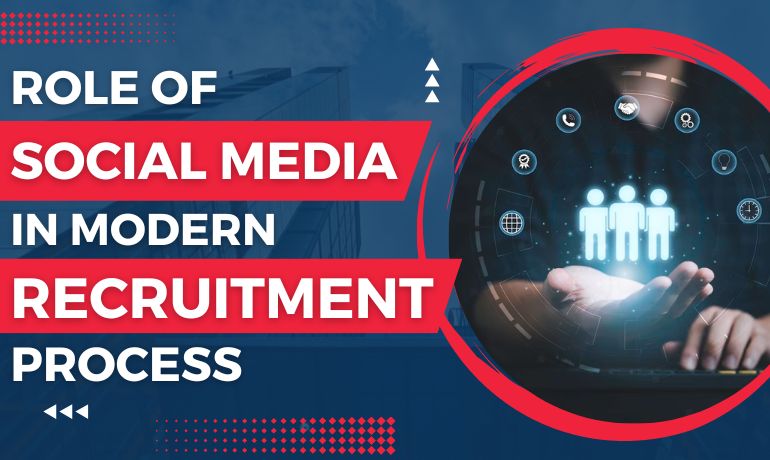In today’s digital age, social media has emerged as a game-changer in various aspects of our lives. One area where its impact has been particularly profound is the realm of recruitment. Gone are the days when job seekers would rely solely on newspaper ads or traditional job boards to find their dream job, and employers would limit themselves to the confines of their local talent pool. Social media has transformed the recruitment landscape, revolutionizing how companies attract, engage, and hire talent.
What is Social Media Recruitment?
Social media recruitment refers to utilizing social media platforms, such as LinkedIn, Facebook, Twitter, and Instagram, to attract, engage, and hire potential candidates for job openings. It involves leveraging the reach and functionality of these platforms to expand the talent pool, showcase employer branding, actively search for candidates, and facilitate candidate screening and engagement, ultimately optimizing the recruitment process.
Facts about Social Media Recruitment
Understanding the significance of social media recruitment for your talent acquisition plan is crucial.
Here are 10 powerful statistics that demonstrate the relevance of social media recruitment:
- 86% of job seekers use social media to search for jobs (CareerArc).
- 71% of hiring decision-makers consider reviewing social media profiles an effective way to screen job applicants (Express).
- 78% of recruiters anticipate increasing social media use for candidate sourcing (Jobvite).
- 70% of hiring managers have hired candidates through social media (Betterteam).
- 73% of millennials (18-34) have found their last job through social media (Aberdeen).
- 82% of organizations have successfully recruited passive job candidates using social media (Marketing Sherpa).
- Job seekers perceive social media and professional networks as the most useful job search resources compared to job boards, job ads, recruiting agencies, and recruiting events (CareerArc).
These statistics highlight the importance of social media recruitment in talent acquisition.
Types of Social Media Recruitment
There are various types of social media recruitment strategies that organizations can employ to attract and engage candidates.
Here are some common types:
- Job Postings:
- Targeted Advertising:
- Employer Branding Content:
- Employee Referral Programs:
- Active Candidate Sourcing:
- Passive Candidate Engagement:
- Online Networking and Groups:
- Social Media Live Events:
- Video and Multimedia Content:
- Influencer Partnerships:
Role of social media in the modern recruitment process
There are numerous advantages of Social Media Recruitment, so the Role of Social Media in the Modern Recruitment Process has increased. Due to the Benefits and Importance of Social Media in the Recruitment Process, it has become the first choice for the people of India and globally.
Here is a list of 10 points highlighting the benefits of Social Media Recruitment
- Expanded Reach:
Social media platforms provide access to a vast global audience, allowing organizations to reach a larger and more diverse talent pool than traditional offline methods.
- Cost-Effectiveness:
Social media recruitment is often more cost-effective than offline methods, as many platforms offer free or low-cost options for posting job openings and engaging with candidates.
- Targeted Advertising:
Social media platforms offer advanced targeting options, enabling recruiters to reach specific demographics, locations, and interests, ensuring the most relevant candidates see job postings.
- Real-Time Interaction:
Social media facilitates instant communication and real-time interaction between recruiters and candidates, speeding up the recruitment process and enhancing candidate engagement.
- Employer Branding:
Social media platforms allow organizations to showcase their company culture, values, and employer brand, attracting candidates who align with their vision and mission.
- Active and Passive Candidate Engagement:
Social media enables recruiters to actively search for candidates and engage with passive candidates who may not be actively job searching but can be enticed by compelling opportunities.
- Screening and Background Checks:
Social media provides additional channels for recruiters to gather information about candidates, allowing for a more comprehensive assessment of their fit with the organization.
- Employee Referrals:
Social media platforms make it easy for employees to share job openings within their networks, increasing recruitment efforts’ reach and leveraging personal connections.
- Analytics and Insights:
Social media platforms provide robust analytics and insights, allowing recruiters to track the performance of job postings, measure engagement, and refine recruitment strategies accordingly.
- Networking Opportunities:
Social media platforms offer networking opportunities, enabling recruiters to connect with industry experts, thought leaders, and potential candidates, expanding their professional network.
Are there any disadvantages of Social media recruitment?
Unfortunately, there are some disadvantages to Social Media Recruitment, as follows:
- Information Overload:
The sheer volume of information on social media can be overwhelming, making it challenging for recruiters to filter through and identify the most relevant candidates.
- Privacy Concerns:
Conducting background checks on social media raises privacy concerns and ethical considerations. Recruiters must respect candidates’ privacy rights and use the information obtained fairly and responsibly.
- Unverified Information:
Information shared on social media may not always be accurate or reliable. Recruiters must exercise caution and verify the information they come across on candidates’ profiles.
- Bias and Discrimination:
Social media recruitment may inadvertently lead to bias and discrimination in the hiring process. Recruiters must be mindful of unconscious biases and ensure fair and unbiased decision-making throughout the recruitment process.
- Time-Consuming:
Engaging with candidates on social media platforms can be time-consuming, particularly when dealing with many applicants or managing multiple platforms simultaneously.
- Negative Online Presence:
Candidates may have a negative online presence that could poorly reflect their suitability for a role or the company’s image. However, relying solely on social media profiles may not provide a complete picture of a candidate’s abilities or character.
- Lack of Control:
Recruiters have limited control over the algorithms and display mechanisms on social media platforms, which can impact the visibility and reach of job postings. Recruiters and organizations need to weigh the advantages and disadvantages of social media recruitment and implement strategies that mitigate potential risks and maximize the benefits.
Final Thoughts
Social media has become an integral part of the modern recruitment process, and TDS Group has effectively utilized its potential to attract and engage top talent. By leveraging various social media platforms, TDS Group has been able to widen its reach and connect with potential candidates, thus increasing the chances of finding the right fit for the organization.
However, it is essential to note that social media should be used with other recruitment strategies to ensure a well-rounded and effective recruitment process. Overall, TDS Group’s success in leveraging social media for recruitment is a testament to the importance of embracing digital tools in modern-day recruitment.






